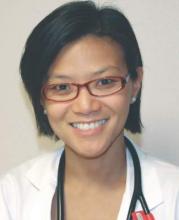Editor’s note: This is Dr. Chan’s last post for her “Rheum in Bloom” column. She is saying goodbye to New England, leaving the private practice setting for a different challenge.
All too often these days, I find myself fidgeting by the doorway to my exam room, trying to conclude an office visit with one of my patients. When I look at my career at midlife, I realize that in many ways I have become the kind of doctor I never thought I’d be: impatient, occasionally indifferent, at times dismissive or paternalistic.
–Sandeep Jauhar, MD
For as long as I’ve been a doctor, doctors have lamented how much medicine has changed. Columnist Charles Krauthammer, MD, wrote a widely-circulated piece in 2015 with the catchy title “Why Doctors Quit,” attributing physician dissatisfaction to the wasteful and frustrating electronic health record mandate. It is worth noting here that Dr. Krauthammer is a political partisan making a point about government overreach and not really about the state of medicine, but the piece certainly resonated with doctors, judging by the number of times it was shared with me. In Medscape’s physician compensation poll of 2016, only 64% of doctors would choose medicine again. In a separate Medscape poll on burnout, under 30% of physicians felt happy at work.
In Dr. Sandeep Jauhar’s book, “Doctored,” (from which the above quote is taken), he cites several issues: the lack of respect that the profession is afforded, the practice of defensive medicine, inadequate compensation, the lack of independence. He goes further: “... Surveys have shown that 30%-40% of practicing physicians would not choose to enter the medical profession if they were deciding on a career again, and an even higher percentage would not encourage their children to pursue a medical career.” He does not say where he got that information, but it sounds plausible.
I asked peers, mostly people I went through training with and therefore generally belonging to my age group. This small, nonrepresentative sample of young physician parents, many of whom are foreign graduates, seemed to belie Dr. Jauhar’s pessimism. Most of my friends thought medicine is still rewarding. They see our profession as emotionally meaningful and intellectually fulfilling – this despite a surprising number of them having been named in ultimately unsuccessful lawsuits. “The headaches are many, but most professions that make decent money have their own set of headaches and problems,” my allergist friend says. In addition, a career in medicine, they feel, would provide their children financial stability. The consensus was that if their children wanted to, my peers would be nothing but supportive.
I asked my boss about it, too. He is older and very vocal about what he perceives as a hostile working environment. If there was just one demographic that Dr. Krauthammer was speaking for, that is exactly the demographic that my boss belongs to. So I was certain that he had similarly dissuaded his son from going into medicine. But I was wrong.
It isn’t that my boss discouraged his son; it’s that his son was not interested. He says if he thought his son might have enjoyed the work he absolutely would have encouraged it. Because as onerous as our profession has become, it is still a meaningful and rewarding one. And as long as we derive meaning from the work that we do, it is much easier to put up with the unsavory parts.
Dr. Chan practices rheumatology in Pawtucket, R.I.


